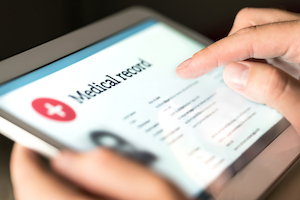Massive data breaches aren’t uncommon in healthcare. In 2018, 15 million patient records were compromised, and while there is usually a lot of talk around protecting your identity from thieves, there isn’t much said about protecting your personal health data — until there is a data breach at healthcare or health insurance company.
Older adults are at an increased risk for medical identity theft thanks to Medicare billing scams, which cost taxpayers $60 billion a year.
Here’s what you need to know to protect your personal health information.
Know Where Your Data Is and Who Has Access
These days, many insurance companies and healthcare practices tout the use of their own apps. Though they may make your life easier, make sure to read the terms and conditions — especially how your data is collected and with whom it is shared — before you begin using any healthcare app. The same goes for your physician’s office. Ask your physician’s office who has access to your data and what it’s used for.
Use Strong Passwords (And Change them Regularly)
Strong passwords are vital in protecting your healthcare data. If you use a patient portal, make sure to change your username and password often. What makes a strong password? It should be long and use a mix of numbers and uppercase and lowercase letters. It shouldn’t be easy to guess, like your last name and birth year, for example. Your passwords for any portal or app that houses your medical data should not be used for anything else.
Monitor Your Data
Keep a careful eye on your healthcare bills and your credit reports. Look out for dramatic changes in your credit score, unauthorized credit card charges, and false medical insurance claims. If you find any fraudulent healthcare activity, notify your health insurance company and your physician’s office immediately.
Be Skeptical of Free Medical Services and Products
Free medical services or products are a common scam. People offering these services usually need your insurance information or Medicare identification number, and providing it lets scammers bill your insurance or Medicare for products you don’t need.
What About HIPAA?
HIPAA is designed to protect your medical data held by healthcare providers, health plans and organizations acting on their behalf. However, HIPAA regulations do not extend to mobile devices or apps that store your healthcare information, a personal health record that is not offered by a health plan or healthcare provider covered by HIPAA, any information you share online (social media, communities or message boards).
Keep your medical information safe by making sure you know how your data is stored and shared, monitoring your health claims and credit reports, using strong passwords and being wary of what you share online.











